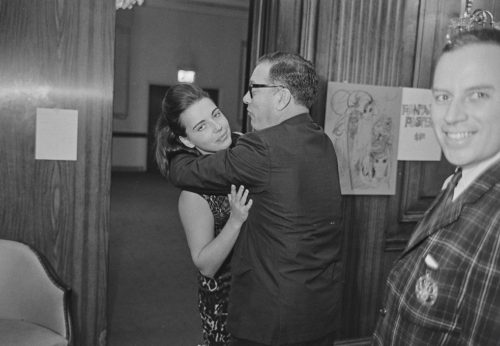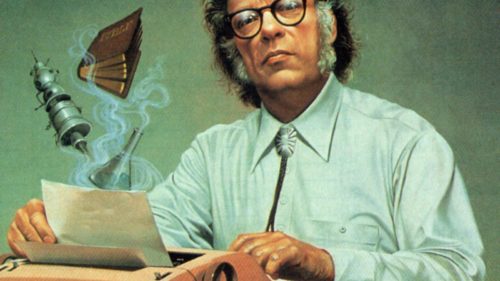Here’s an experience most of us had during the #MeToo movement: a cherished cultural figure – a favorite musician, filmmaker, author, actor, et al. – did bad things. The victims of those actions came forward. These events provoked in us as many reactions as it did experiences – from revulsion to condemnation to indifference to defensiveness or even apologism. Some of the cultural figures I love were a part of this, including Isaac Asimov.
As Alec Nevala-Lee documents, Asimov had a reputation as a harasser, and the science fiction community knew all about it. Asimov exemplified for Nevala-Lee a certain type of harasser: the awkward, nerdy boy who, through his intellectual efforts and outputs, gained social power with which to lord over women who wouldn’t otherwise attend to him.
Here are some thoughts on Asimov: what his work meant to me, how I see that work now, and how harassment locks people – especially women – out of spaces.
Isaac Asimov and I
So, like every smart kid in a middling school, I spent lots of time in the school library. And like many underfunded public schools, my school’s library carried inexpensive intro books on every topic. Guess who wrote inexpensive intro books on every topic? The kind libraries carried in the 1980s and 1990s? Isaac Asimov did.
And that’s no joke. Asimov wrote about everything. Maybe you know him as a science fiction author. So do I. The Foundation series books were the first Asimov books I remember reading. But I also know him as the guy who wrote about ancient and medieval history, astronomy, the Bible, biology, and Shakespeare. When you’re a kid at a school in rural Indiana, you have a hard time getting an education in the classroom. But you could damn well get one from Isaac Asimov at the library. At least you could in the 1990s.
And so, I learned a lot from Asimov, and I was grateful for it. I wrote book reports on his work in middle school and high school. Hell, I even dressed as him for a school project once. Of course, I didn’t yet know about the harassment issue.
Who Was Isaac Asimov?
Isaac Asimov was born in the Soviet Union (technically the Russian Soviet Federative Socialist Republic) in 1920. His family moved to Brooklyn not long after, joining many Jewish immigrant families in early 20th century Brooklyn. His father owned a small shop, also joining many Jewish immigrant families in early 20th century Brooklyn.
If the biography sounds familiar, it should. Many beloved cultural figures hailed from east coast Jewish immigrant families. There’s Noam Chomsky or Bernard Malamud…or Bernard Sanders. Filmmakers like Mel Brooks or Stanley Kubrick. Their contributions to U.S. culture are beyond measure. Asimov is a key part of that story.
But the rest of these guys aren’t serial gropers. By contrast, everyone in science fiction knows about Asimov. There are dozens – probably hundreds of stories. There are photos. Here’s one.

Source: https://www.publicbooks.org/asimovs-empire-asimovs-wall/
Was he the only person doing it? No. It seems to have been fairly common in science fiction circles. But cumulatively it was damaging. And it pushed women further to the margins of a niche of the publishing world where they already existed at the margins. It was damaging, and Asimov’s part especially so given the size of his output…both his literature and his behavior.
Cultural Contributions and Bad Behavior
You might wonder whether we’d find evidence of bad behavior from the literary corpus of Isaac Asimov. Yes and no.
Asimov always professed liberalism. He expressed liberal opinion on the issues of his day, including gender and gender equality. On the other hand, his science fiction work wasn’t exactly full of strong women characters. Dr. Susan Calvin from his robot stories was a notable exception, but she was still an exception. Many of his stories had no women at all.
Asimov admitted as much in his own autobiographies. Yes, he wrote more than one. He explained some of it – correctly, I think – as the way things were done in science fiction at the time. ‘Lacks strong women characters’ is a charge we could lob at most science fiction from the 1940s and 1950s. But he also explained it as the behavior of…a nerdy boy who was awkward and fumbling with young women, which takes us back to that article on Asimov and harassment.
Current Reactions
How we feel consuming these media today depends – to some degree – on our own experiences. His history of harassment doesn’t prevent me from enjoying Isaac Asimov stories or learning from his nonfiction. I still think the Foundation series is brilliant, and I think the same about the Robot series. But some things are different now. Asimov’s work includes some off-color and/or gendered jokes I can’t read the same way. But, overall, my experience is mostly the same.
I’d make much the same point about the cultural products of people who did very bad things, like Woody Allen films. I like Allen’s style of filmmaking – exploring the neuroses of the highly educated and/or upper middle class. Some things I watch differently now, especially Allen’s portrayal of imbalanced power relationships between older men and younger women. But, overall, my experience is mostly the same.
Many people – especially victims of harassment and sexual assault – don’t have the luxury of consuming these products with the same enjoyment. This is another way harassment and assault push their victims to the margins.
